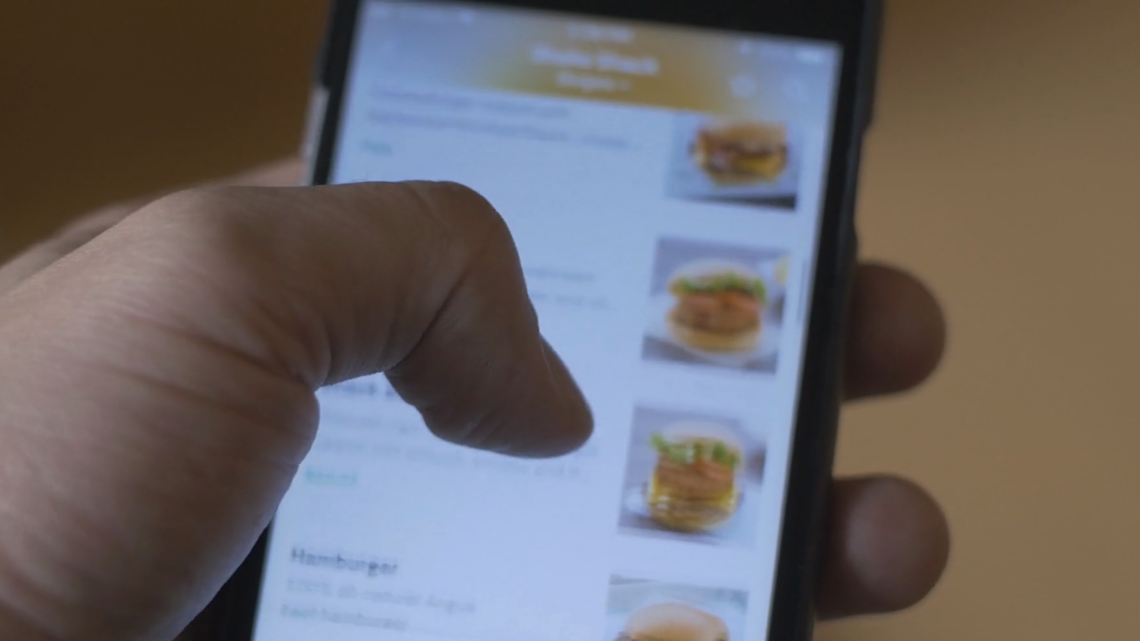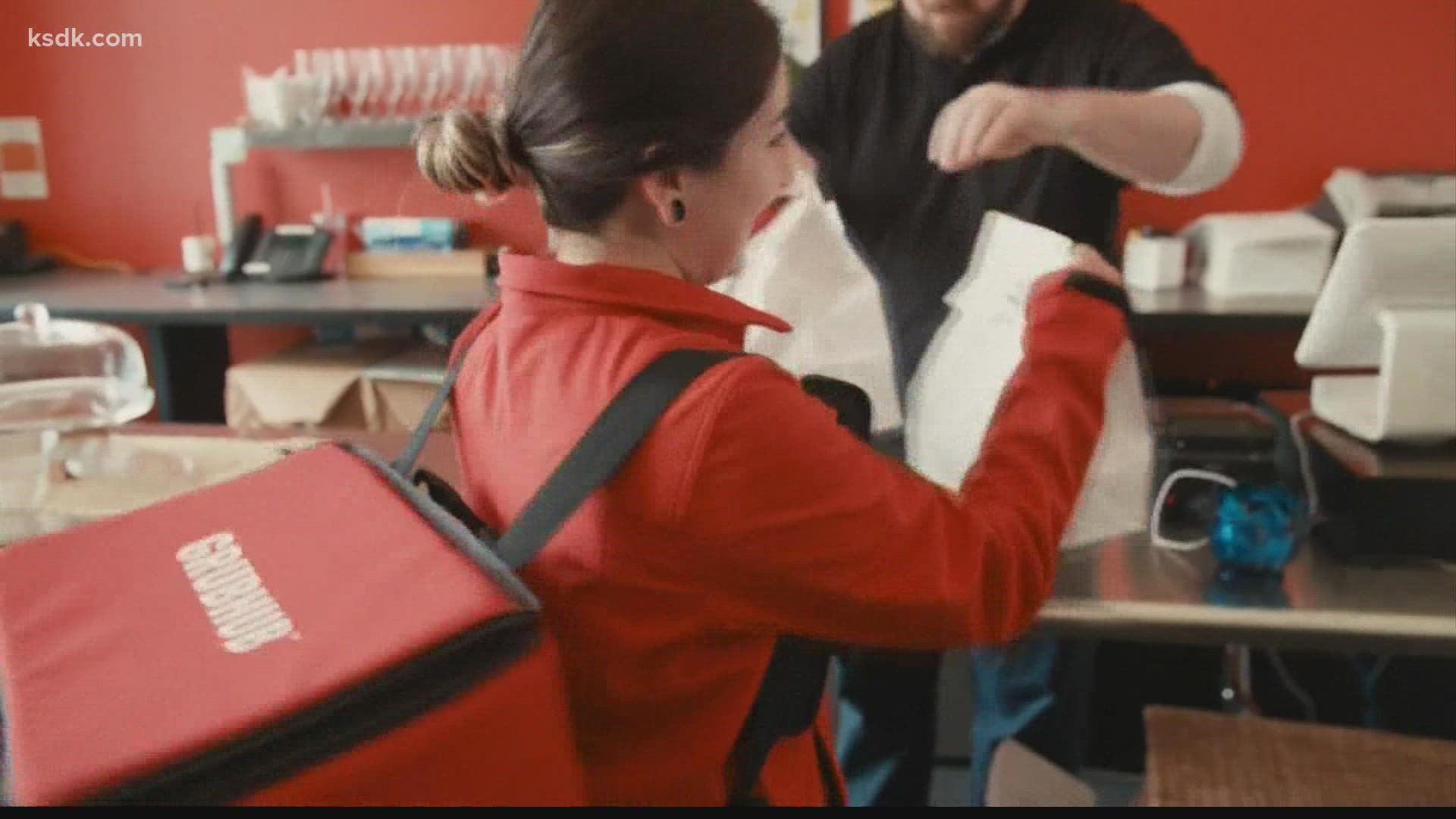ST. LOUIS — Food delivery apps promise convenience for the eater and a little extra cash for the driver. They boomed in popularity during the pandemic, with one in three families using a delivery app to safely bring them the restaurant experience. Thousands of new drivers signed up to replace income they lost due to COVID-19.
Some St. Louisans are learning that the true cost of that burger or burrito could be higher than the price on the screen.
"When their driver was leaving, they heard a bang," said Calvin Horning.
That bang was a DoorDash driver hitting Horning's car.
"It bent the door off the frame a bit and messed up the seal in the door. It was raining that morning, so it got wet inside," he added.
Before long, Horning had a bigger issue than a standard fender bender: "We filed a claim with DoorDash stating everything that had happened. And that's when they replied that since he was not actively on the delivery, since he had already completed his delivery, that they would not be taking responsibility for it."
The I-Team found that policies vary between food delivery companies as far as coverage for drivers if they're in an accident in between orders. For DoorDash drivers, even if the app is open and they just finished a delivery, they are only covered by their own liability insurance, according to a company spokesperson.
Horning was distressed to learn that nobody checked whether the delivery driver that struck his car had liability insurance before letting him take orders.
"He does not have insurance on his car," Horning said.
In Illinois and Missouri, businesses aren't required to provide any insurance for their delivery drivers.


The two biggest delivery companies, GrubHub and DoorDash, require their drivers to have proper insurance, but don't ask to see proof. They only have drivers agree to have liability insurance before they start delivering.
On top of that, delivery drivers can't count on their personal liability insurance to cover them either.
"They're screwed. There's no nice way to put it," said Brett Slaughter, an Uber and Lyft driver in the Metro East.
When Slaughter's daughter became a Papa John's delivery driver, he learned from the manager her job would come with an added risk.
"I talked to her manager there and he says, oh yeah, when they're driving, we use your personal insurance," said Slaughter. "I called my insurance company Allstate, and they pretty much confirmed what I had found online, that as long as she's driving for a big name now...because it's a corporate one, they won't. It's explicitly forbidden."
The I-Team reached out to Papa John's to ask about their policies for drivers and insurance. Their representative did not respond.
Carrie Couch, director of Consumer Affairs at the Missouri Department of Insurance, said this is to be expected in many auto policies.
"Your personal auto policy is not going to cover any type of business operation, including delivering pizzas," said Couch. "I don't think that's a requirement...for businesses that have delivery drivers, that's going to be something that's going to be a business decision by that particular company."
A representative for the Illinois Secretary of State's office stated that Illinois also does not have statutory requirements for food delivery drivers who work from their personal vehicles, or the apps that pay them.
The lack of coverage creates a situation that puts both drivers and the public at risk as people sign up to deliver food.
"I'm afraid for how many young kids are out there doing this now that I don't know," said Slaughter. "One little accident will set you back thousands upon thousands of dollars. Just for a ten dollar an hour wage."
Slaughter said his daughter decided it was just too risky.
And Horning had to pay out of pocket to fix his own car.
"It's everyday people that they're really hurting in the long run. It's their employees that they're hurting by not covering them and also the citizens around them," said Horning.
The I-Team reached out to the largest food delivery app companies and the largest pizza delivery chains to ask about their policies.
Door Dash
DoorDash's representative shared that their commercial auto insurance policy covers bodily injury and property damage to third parties while the driver is on an active delivery, meaning after accepting an order and before completing the order. Drivers must maintain their own insurance while on the platform, and drivers are eligible for occupational accident insurance that covers them if they’re injured while delivering.
GrubHub
GrubHub's representative wrote: "Drivers are required to maintain insurance that satisfies all state and local requirements and provides coverage for all activities connected to the work they do for delivery services. We encourage drivers to handle any claims with their insurance provider." They added, "Grubhub doesn't provide its own insurance."
Uber Eats and Postmates
The representative for Uber, discussing UberEats and Postmates, wrote: "Food delivery couriers using a vehicle on the Eats app are required to provide evidence of valid/state compliant personal auto insurance as part of the onboarding process…Uber maintains commercial auto insurance on behalf of Eats drivers using a vehicle while operating on the Uber App.” They added that this includes time between active deliveries.
Inquiries to Papa John's, Pizza Hut, and Domino's were not answered.
This story will be updated as we receive additional comments.

